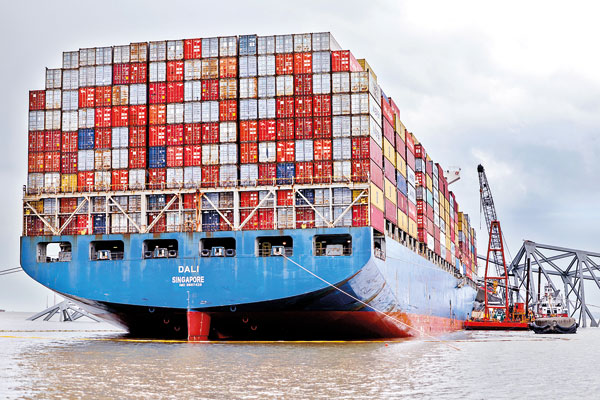News
Chemical on board Dali was raw material used to make industrial gloves, says BOI company
View(s):- Vessel was carrying resin solution, categorised as hazardous; Ansell Lanka says it adheres to regulations
By Sunimalee Dias
A Board of Investment (BOI) company in Sri Lanka is the importer of the hazardous material scheduled to have been shipped to Colombo, according to the manifest of the “Dali” vessel chartered by Maersk. More vessels with hazardous materials are also expected to be due at the Colombo Port.
The company, “Ansell Lanka,” based at the Biyagama Export Processing Zone, had ordered to import a stock of Resin Solution; a substance considered a hazardous material, shipped as DG Cargo or Dangerous Cargo. Sri Lankan authorities had not been notified of the shipment by the time the collision occurred.
The Singapore-flagged “Dali” container vessel collided with the Francis Scott Key Bridge in Baltimore, USA, on March 26.
When the Sunday Times contacted Ansell Lanka, its General Manager Ramesh Nanayakkara, said they had one container on the Dali vessel bound for Colombo that contained a chemical classified as hazardous, which is used in the normal manufacturing process.
When asked to comment on the recent media reports alleging there was hazardous waste bound for Colombo, Mr. Nanayakkara said Ansell Lanka does not import any type of waste as it is a violation of international laws, and definitely not within Ansell’s business practices. He said they only import packaging material and raw materials, some of which can be in the form of chemicals, both deemed hazardous and non-hazardous. The hazardous nature of the chemicals is classified in line with the Globally Harmonized System (GHS).
The chemical on board the Dali is a raw material used in the manufacture of industrial gloves, and has been imported for over two decades, he noted. The country of origin of this particular chemical is the USA.
When told that local authorities like the Central Environment Authority (CEA) claim no clearance was obtained in advance, he explained, “Our approvals for importation of chemicals or any other materials are regulated primarily by the BOI, and the necessary required approvals, or no objection letters, are attached with the Customs Declaration. These can sometimes include the Ministry of Defence, the Precursor Control Authority, and others. If the CEA is not on the required list of approvers, then it makes sense that we would not be going to them for the clearance.”
The General Manager also said that all their imports are subject to required import control regulations and that nothing can be imported, especially to a BOI Export Processing Zone, which is a customs bonded area, without obtaining the required approvals.
US reports have quoted the National Transportation Safety Board in the US as stating that 56 of the 4,700 containers aboard the Dali held 764 tons of hazardous materials, including corrosives, flammables, and so-called Class 9 hazardous materials like lithium-ion batteries. Fourteen containers broke open as a result of the collision, spilling soap, perfume products, and resin material into the Patapsco River, authorities in the US said.

BALTIMORE, MARYLAND - APRIL 04: Cranes and salvage personnel work to clear the wreckage of the cargo ship Dali after it collided with the Francis Scott Key Bridge on April 04, 2024 in Baltimore, Maryland. The bridge collapsed after being struck by the 984-foot cargo ship Dali at 1:30AM on March 26. Kevin Dietsch/Getty Images/AFP (Photo by Kevin Dietsch / GETTY IMAGES NORTH AMERICA / Getty Images via AFP)
The manifest of the Dali states that it had been carrying one container that had the consignment of hazardous material to be discharged as local cargo for manufacturing purposes at the Colombo Port. The rest of the over 500 containers were said to be transshipment cargo due for India.
Sri Lanka is a party to the Basel Convention on the Control of Transboundary Movements of Hazardous Waste and Their Disposal, which entered into force in 1992. The CEA points out that under the Convention, if there is any vessel carrying hazardous material or any type of waste, it should be informed to the relevant authorities from the country it is originating from, which would then inform the destination authorities. This procedure is usually followed by exporters in order to ensure that they obtain the necessary clearance in advance.
“Normally, exporters want clearance, so they send the information as early as possible,” a CEA official said. He noted that, however, in the case of the consignment of the Dali vessel, this was not informed to the relevant authorities concerned.
A National Coordinating Committee representing all relevant stakeholders has been formed to engage in the discussion on the issues surrounding the current concerns. A meeting of this committee and its stakeholders took place on Friday.
The best way to say that you found the home of your dreams is by finding it on Hitad.lk. We have listings for apartments for sale or rent in Sri Lanka, no matter what locale you're looking for! Whether you live in Colombo, Galle, Kandy, Matara, Jaffna and more - we've got them all!

